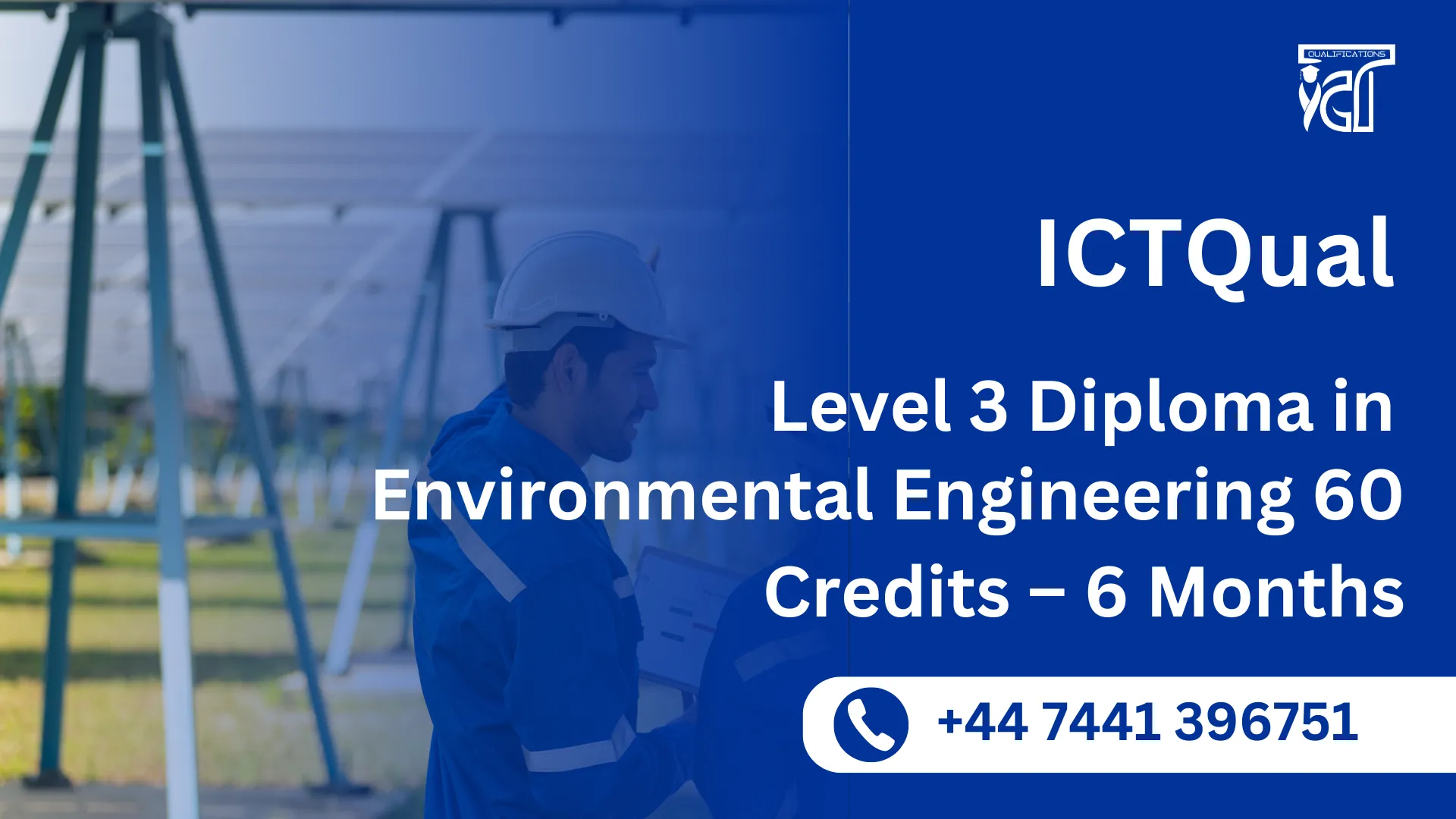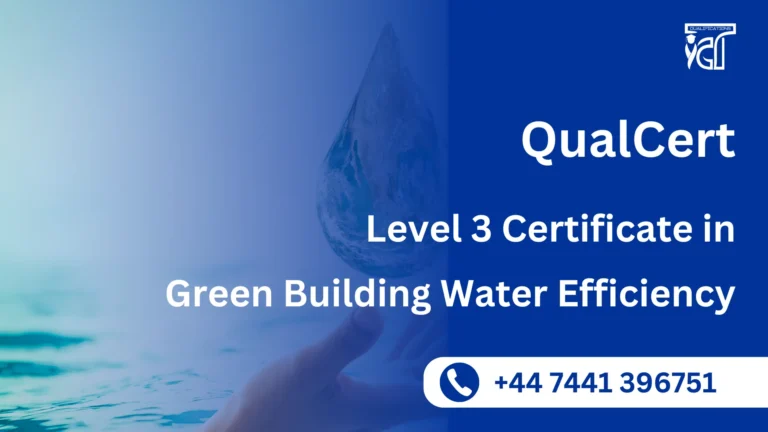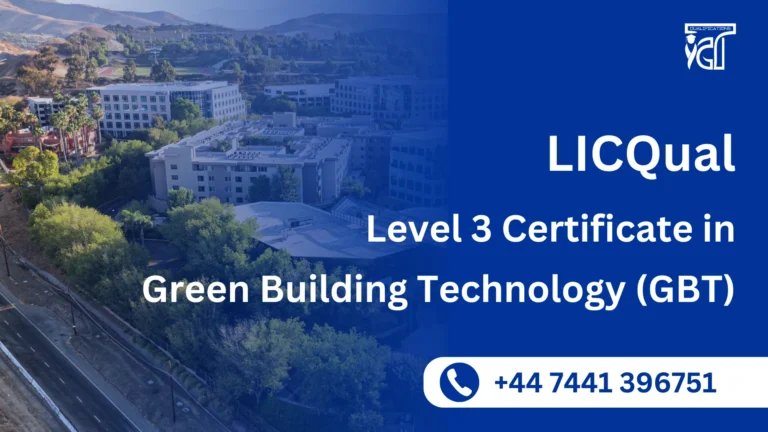As global awareness of environmental issues continues to rise, the need for skilled professionals in environmental engineering is at an all-time high. The ICTQual Level 3 Diploma in Environmental Engineering (60 Credits – 6 Months) is designed to provide individuals with a strong foundation in environmental science and engineering principles, making it the perfect entry point for a career in sustainability, renewable energy, and pollution control.
This Ofqual-regulated qualification offers a practical, hands-on approach to learning, ensuring students develop the technical knowledge and problem-solving skills necessary to address the world’s pressing environmental challenges.
The ICTQual Level 3 Diploma in Environmental Engineering (60 Credits – 6 Months) is a concise and focused program aimed at equipping students with the core competencies needed to work in environmental engineering and sustainability. With its 6-month duration and 60 credits, this qualification is ideal for individuals who want to gain a solid grounding in environmental concepts and make an immediate impact in the field.
This diploma covers essential topics such as pollution control, renewable energy, waste management, and environmental legislation. It’s designed for those looking to pursue entry-level positions or expand their expertise in the ever-growing field of environmental engineering.
By completing this qualification, students will gain the skills required to assess, manage, and mitigate environmental impacts, while contributing to the global transition towards more sustainable practices.
The ICTQual Level 3 Diploma in Environmental Engineering provides students with an in-depth understanding of the scientific and engineering principles that underpin environmental protection and sustainable development. The course consists of core modules that cover key areas in environmental science, pollution control, and energy efficiency, allowing students to gain both theoretical knowledge and practical skills that are directly applicable to real-world situations.
In just 6 months, this 60-credit diploma enables individuals to gain a well-rounded understanding of environmental issues, equipping them with the skills needed to work in various sectors such as energy, waste management, construction, and environmental consultancy.
The ICTQual Level 3 Diploma in Environmental Engineering (60 Credits – 6 Months) provides a fast, flexible, and comprehensive pathway into the world of environmental engineering. Whether you’re an aspiring engineer, a professional looking to specialize, or someone keen on transitioning into the sustainability sector, this course offers the foundational knowledge and practical skills required to thrive in an environmentally conscious world.
With its Ofqual-regulated status, international recognition, and emphasis on renewable energy, pollution control, and sustainable practices, this diploma positions you for a successful and impactful career in the growing field of environmental engineering.
ICTQual Level 3 Diploma in Environmental Engineering 60 Credits – 6 Months
Following are the study units of ICTQual Level 3 Diploma in Environmental Engineering 60 Credits – 6 Months:
- Fundamentals of Environmental Engineering
- Sustainable Development and Green Engineering
- Pollution Control and Resource Management
- Environmental Monitoring and Reporting
- Environmental Policy and Governance
- Advanced Topics in Environmental Engineering
GLH (Guided Learning Hours) and TQT (Total Qualification Time) are terms commonly used in vocational qualifications to help define the amount of time a learner is expected to spend on their studies.
1. GLH (Guided Learning Hours)
GLH refers to the number of hours a learner spends being directly taught, supervised, or supported during their course. This includes the time spent in activities such as:
- Classroom instruction
- Practical workshops
- One-on-one tutoring or mentoring sessions
- Online learning sessions with tutor support
In other words, GLH represents the time that learners are actively engaged with their instructors or learning activities.
2. TQT (Total Qualification Time)
TQT represents the total amount of time a learner is expected to invest in completing a qualification, including:
- GLH (Guided Learning Hours): Time spent on direct learning, as explained above.
- Self-Directed Learning: This includes time spent on independent study, research, assignment completion, preparation for exams, and any other work the learner does outside of direct teaching hours.
TQT is a broader measure that includes all the time required to achieve the qualification. It helps learners and employers understand the overall commitment required for the qualification.
Key Differences Between GLH and TQT:
- GLH focuses on direct learning with guidance or supervision.
- TQT includes GLH as well as independent study time and other learning-related activities.
Example:
If a qualification has a TQT of 600 hours and a GLH of 250 hours, it means the learner should spend 250 hours in direct learning (classroom, online, or tutor-led sessions) and 350 hours on independent study or research.
Below are the learning outcomes for each of the study units in the ICTQual Level 3 Diploma in Environmental Engineering program:
Unit 1: Fundamentals of Environmental Engineering
By the end of this unit, learners will be able to:
- Understand core principles of environmental science and their relevance to engineering.
- Explain the structure and function of ecosystems and their interconnections.
- Analyze key environmental challenges such as climate change, biodiversity loss, and resource depletion.
- Apply foundational knowledge to assess environmental impacts and propose engineering solutions.
Unit 2: Sustainable Development and Green Engineering
By the end of this unit, learners will be able to:
- Define sustainable development and its importance in engineering practices.
- Identify and evaluate green engineering techniques for reducing environmental impact.
- Demonstrate knowledge of renewable energy sources such as solar, wind, and bioenergy.
- Assess strategies for energy efficiency and resource conservation in engineering projects.
Unit 3: Pollution Control and Resource Management
By the end of this unit, learners will be able to:
- Describe the main types and sources of pollution affecting air, water, and soil.
- Evaluate methods for reducing and mitigating pollution in various environments.
- Analyze resource management strategies and their impact on sustainability.
- Develop an understanding of waste minimization and recycling techniques.
Unit 4: Environmental Monitoring and Reporting
By the end of this unit, learners will be able to:
- Explain the principles of environmental monitoring and its importance.
- Identify tools and methods used to measure air, water, and soil quality.
- Analyze environmental risk assessment processes.
- Interpret and document environmental data for reporting and decision-making.
- Understand the role of GIS in monitoring environmental changes.
Unit 5: Environmental Policy and Governance
By the end of this unit, learners will be able to:
- Understand global environmental laws and treaties.
- Explain the role of national and international regulatory frameworks in environmental protection.
- Assess the contribution of governments, NGOs, and businesses to environmental governance.
- Analyze policies aimed at addressing climate change and promoting sustainability.
- Evaluate the ethical and social implications of environmental policies.
Unit 6: Advanced Topics in Environmental Engineering
By the end of this unit, learners will be able to:
- Explore emerging technologies in environmental engineering.
- Explain innovations in water treatment, air purification, and renewable energy systems.
- Analyze sustainable urban planning and infrastructure development approaches.
- Assess engineering solutions to address global environmental challenges.
- Understand the application of advanced techniques in solving complex environmental issues.
Here are the key benefits of the ICTQual Level 3 Diploma in Environmental Engineering (60 Credits – 6 Months):
1. Ofqual-Regulated Qualification
- The ICTQual Level 3 Diploma is Ofqual-regulated, ensuring it meets the highest educational standards. This provides assurance that the qualification is recognized and respected by employers globally, enhancing your career prospects both locally and internationally.
2. Short Duration for Quick Career Entry
- With a 6-month duration, this diploma allows you to quickly acquire the foundational knowledge and skills needed to kickstart your career in environmental engineering. It’s perfect for those looking for a concise and efficient pathway into the field, without committing to a long-term study program.
3. Comprehensive Coverage of Environmental Engineering Principles
- The course provides a solid grounding in core topics like pollution control, renewable energy systems, and sustainable waste management. This comprehensive coverage equips you with the skills needed to tackle real-world environmental challenges, making you an asset in various industries that prioritize sustainability.
4. Practical, Hands-On Learning
- The diploma emphasizes practical skills, ensuring that students gain real-world experience in environmental engineering techniques. You’ll learn how to apply the principles of environmental science and engineering to address issues such as pollution, resource management, and sustainable development.
5. Global Recognition
- As the course is Ofqual-regulated, it’s recognized worldwide, making it easier for you to pursue career opportunities both locally and internationally. Whether you’re looking to work in energy management, sustainability consulting, or environmental policy, the qualification is respected across the globe.
6. Flexibility for Working Professionals
- This short-term course is designed to be flexible, allowing working professionals to enhance their skills while continuing their job. The compact structure of 6 months ensures that the program is manageable for individuals with existing professional commitments.
7. Career Advancement and Job Market Competitiveness
- The course provides you with a competitive edge in the growing environmental sector. It opens up opportunities in various fields, such as environmental consultancy, renewable energy, waste management, and pollution control, making you a desirable candidate for employers seeking individuals with knowledge of sustainability and green technologies.
8. Pathway to Further Education
- Graduates of the ICTQual Level 3 Diploma can progress to higher-level qualifications such as the Level 4 or Level 5 Diplomas in environmental engineering or related fields. This offers an excellent pathway for students seeking to further their education and specialize in advanced areas like environmental management or sustainability practices.
9. Practical Knowledge in Renewable Energy
- As the world increasingly focuses on green energy, the course provides key insights into renewable energy systems, including solar, wind, and biomass energy. Understanding these systems prepares you to contribute to the global shift towards sustainable energy solutions.
10. Immediate Impact on the Environment
- By acquiring this diploma, you gain the ability to implement practical solutions that address environmental issues such as pollution, climate change, and resource depletion. The course equips you with the tools needed to help reduce environmental harm and promote a sustainable future.
In summary, the ICTQual Level 3 Diploma in Environmental Engineering offers a practical, fast-track route to gaining essential skills in sustainability, renewable energy, and environmental management. Whether you’re starting your career, looking to specialize, or aiming to further your studies, this qualification provides the foundational knowledge needed to thrive in the growing field of environmental engineering.
The ICTQual Level 3 Diploma in Environmental Engineering (60 Credits – 6 Months) is an ideal fit for a wide range of individuals who are passionate about sustainability, environmental protection, and seeking to start or advance their careers in the field of environmental engineering. Here’s a breakdown of who will benefit most from this course:
1. Aspiring Environmental Engineers
- If you’re looking to enter the environmental engineering field and contribute to the global movement toward sustainability, this diploma is a great starting point. It provides a strong foundation in core environmental concepts such as pollution control, renewable energy, and waste management, enabling you to begin your career in various sectors focused on environmental sustainability.
2. Graduates with a Background in Science or Engineering
- Graduates with a degree in environmental science, civil engineering, or any related field who wish to specialize in environmental engineering or expand their expertise in green technologies will find this course highly beneficial. It offers the specialized knowledge needed to advance into roles focused on sustainability and renewable energy.
3. Individuals Looking to Transition Into the Environmental Sector
- This course is also perfect for professionals from other industries who wish to transition into environmental engineering or sustainability. Whether you are in construction, energy, or manufacturing, the diploma equips you with the technical knowledge needed to apply sustainable practices and green technologies in your current or future career.
4. Sustainability Enthusiasts Seeking a Formal Qualification
- If you’re passionate about protecting the environment and want to turn your passion into a career, this diploma provides you with the practical skills and industry-recognized qualification to work in the field of sustainability. It’s an excellent choice for individuals looking to work in roles such as environmental consultants, sustainability managers, and pollution control specialists.
5. Technicians and Professionals in Environmental Fields
- Environmental technicians and professionals working in fields like environmental health, waste management, or resource management who wish to deepen their expertise and gain a formal qualification in environmental engineering will benefit from this diploma. It provides advanced technical skills to help them tackle environmental challenges effectively.
6. Early Career Professionals or Entry-Level Candidates
- If you are early in your career and looking to enter a growing field, the ICTQual Level 3 Diploma provides a comprehensive introduction to environmental engineering. It’s particularly suited for individuals seeking entry-level roles in environmental management, renewable energy, and sustainable development.
7. Career Changers
- For those looking to switch careers and pursue a new path in environmental engineering or sustainability, this course offers the essential foundational knowledge and skills required to start a successful career. It’s a great fit for individuals interested in green energy, environmental protection, or climate change mitigation.
8. Government Employees or Policy Makers in Environmental Fields
- Government workers or policy makers involved in environmental regulation, sustainable development, or urban planning will find this diploma beneficial as it provides an understanding of environmental legislation and sustainability practices. It equips them with the knowledge to make more informed decisions about sustainable urban planning and environmental policies.
In summary, the ICTQual Level 3 Diploma in Environmental Engineering is perfect for individuals looking to launch or advance their careers in environmental engineering, sustainability, and renewable energy. Whether you’re a graduate, a career changer, or a professional seeking to specialize in green technologies, this qualification provides the technical knowledge and practical experience required to excel in the dynamic field of environmental engineering.
Entry Requirements
Register Now
Qualification Process
Qualification Process for the ICTQual Level 3 Diploma in Environmental Engineering 60 Credits – 6 Months
- Self-Assessment:
Begin by evaluating your eligibility to ensure you meet the qualification requirements, including work experience, knowledge, and language proficiency. - Registration:
Complete your registration by submitting the required documents, including a scanned copy of a valid ID, and paying the registration fee. - Induction:
An assessor will conduct an induction to confirm your eligibility for the course and explain the evidence requirements. If you do not meet the criteria, your registration will be canceled, and the fee will be refunded. - Assignmnets & Evidence Submission:
Provide all assignmnets and the necessary evidence based on the assessment criteria outlined in the course. If you are unsure of the required evidence, consult with the assessor for guidance on the type and nature of evidence needed. - Feedback and Revision:
The assessor will review your submitted evidence and provide feedback. Evidence that meets the criteria will be marked as “Criteria Met,” while any gaps will be identified. You will be asked to revise and resubmit if needed. - Competence Evidence:
Submit final evidence demonstrating that all learning outcomes have been met. This evidence will be marked as “Criteria Met” by the assessor once it is satisfactory. - Internal Quality Assurance (IQA):
The Internal Quality Assurance Verifier (IQA) will review your evidence to ensure consistency, quality, and compliance with standards. - External Verification:
The IQA will submit your portfolio to ICTQUAL AB External Quality Assurance Verifiers (EQA) for final confirmation. The EQA may contact you directly to verify the authenticity of your evidence. - Certification:
Upon successful completion of all checks, ICTQUAL AB will issue your official certificate, confirming that you have attained the ICTQual Level 3 Diploma in Environmental Engineering 60 Credits – 6 Months.







